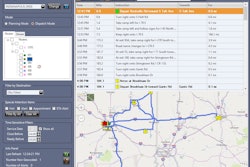
Technology news and briefs for the week of Nov. 6, 2022:
Logistics tech company offers AI feature for capacity optimization
A Texas-based logistics technology provider has launched a new feature to its proprietary final-mile automation platform.
Fleet Enable’s Capacity Optimization replaces manual calculations with artificial intelligence to determine cargo size and truck capacity, then dictate how orders are stowed in vehicles with a goal to eliminate shipment failures in the final-mile delivery sector.
It takes electronic requests from shipping customers to auto-generate orders. A dispatch scheduling tool calculates variables from appointment windows and truck availability to truck floor space and maximum weight. The tool then automatically generates delivery routes that adhere to delivery constraints.
The technology works to ensure that all final-mile orders are on-time and underweight.
Final-mile carriers run the risk of missed deliveries when shipments are overweight or won’t fit on trucks. Fleet Enable said its tool can help carriers avoid costly delivery exceptions or emergency deliveries.
“There is a lot of complexity in determining what freight will fit onto a truck that ends up increasing the odds of a delivery failure. Capacity Optimization ensures we are creating the most profitable routes that can be scheduled, loaded, unloaded and delivered at the appropriate time,” said Fleet Enable CEO Krishna Vattipalli. “Our technology is smart enough to consider all of a shipment’s dimensions and weight and create a dispatch plan that will be successfully executed by the driver. In a market driven by high customer expectations, tight delivery windows and low margins, Capacity Optimization can strengthen a final-mile carrier’s reputation and protect its bottom line.”
Fleet Enable rolled out its final-mile automation software a year ago. Its platform digitizes everything from scheduling to invoicing and driver pay settlement. In October, the company rolled out Fleet Enable Intelligence software that predicts volume shifts, on time deliveries, revenue and driver performance.
Trucker Path adds Geotab ELD, telematics
A popular mobile app for truckers has enhanced its suite of products and services.
Trucker Path has added Geotab ELD and telematics technologies, which has over 3 million devices in operation and processes more than 55 billion data points per day.
“With this new, affordable offering, Trucker Path customers can get everything they need to run their trucking company all in one place,” said Trucker Path Chief Marketing Officer Chris Oliver. “Our ‘business-in-a-box’ approach now includes regulatory compliance, load sourcing, operations management, truck navigation, parking availability, weigh station statuses, dock insights, fuel savings, document scanning, customer invoicing, factoring and even a dispatch service that combines it all to handle all the back-office work for owner operators and small fleets.”
Branded as Trucker Path ELD Powered by Geotab, the solution’s ELD technology provides hours of service and DVIR compliance while the telematics adds vehicle utilization, performance and health assessments along with a wealth of other telematics-driven capabilities. The new offering is available in conjunction with other Trucker Path services, including the app; the TruckLoads digital freight exchange that connects drivers, carriers and brokers; Operations & Driver Relationship (ODR) platform COMMAND, which provides TMS technologies to small to mid-size fleets; and DISPATCH, a full-service dispatch service designed specifically for small carriers and owner-operators.
Integration offers heavy-duty customers document management
Procede Software, a heavy-duty commercial vehicle dealer management system (DMS) and solutions provider, is now offering its customers end-to-end document management and workflow automation via a partnership with Business Process Automation (BPA) and document management solutions provider DocuPhase.
DocuPhase and Procede’s Excede API have integrated to enable users to digitally capture, sort and store documents as well as automate workflows associated with many of their most common processes.
"By moving away from manual, paper-based processes and leveraging automation, dealerships can gain back-office efficiencies, operate more effectively and save hours of time each week," said DocuPhase CEO Dan Gaertner.
DocuPhase uses advanced optical character recognition (OCR) to capture information in documents, then automatically sorts them and stores them in an integrated document repository. New documents can easily be added to the system via email or using drag-and-drop functionality, while existing documents can be searched for and accessed through the Excede integration.











